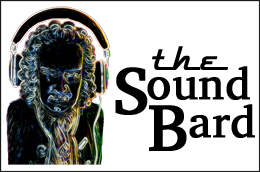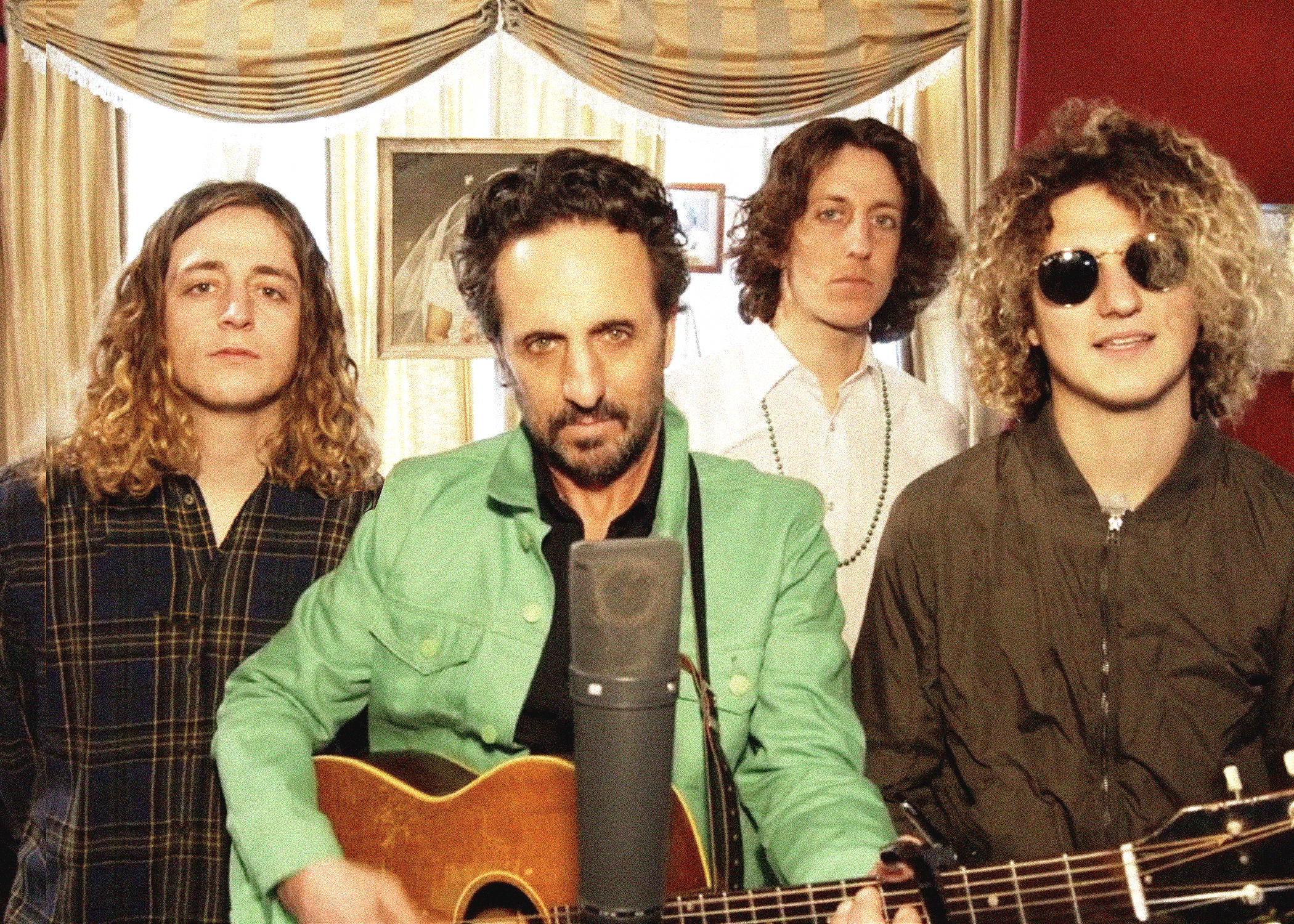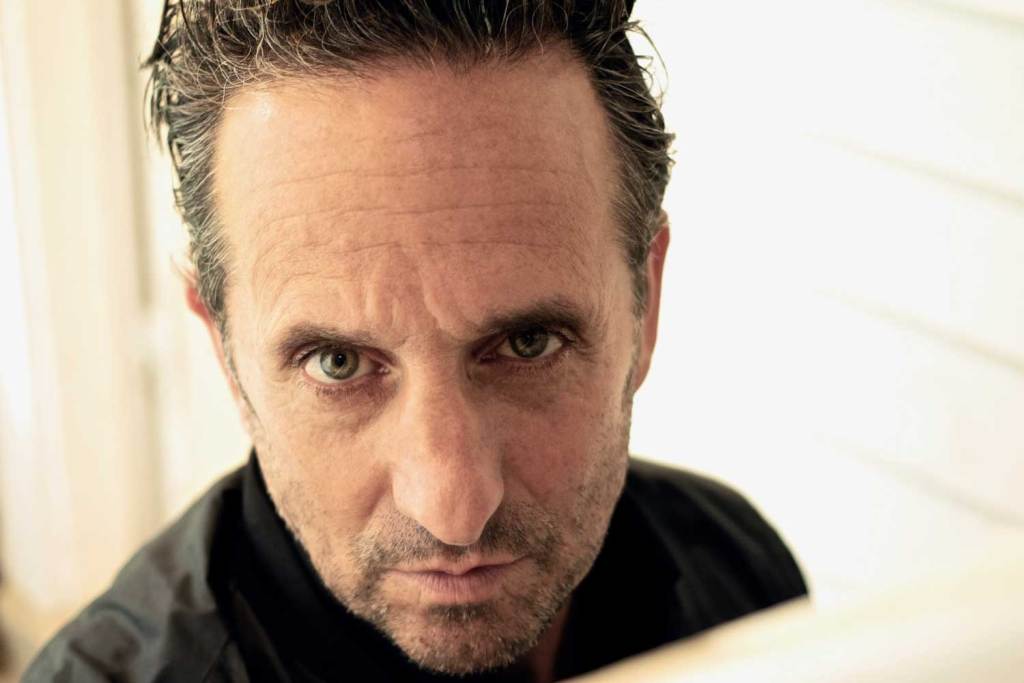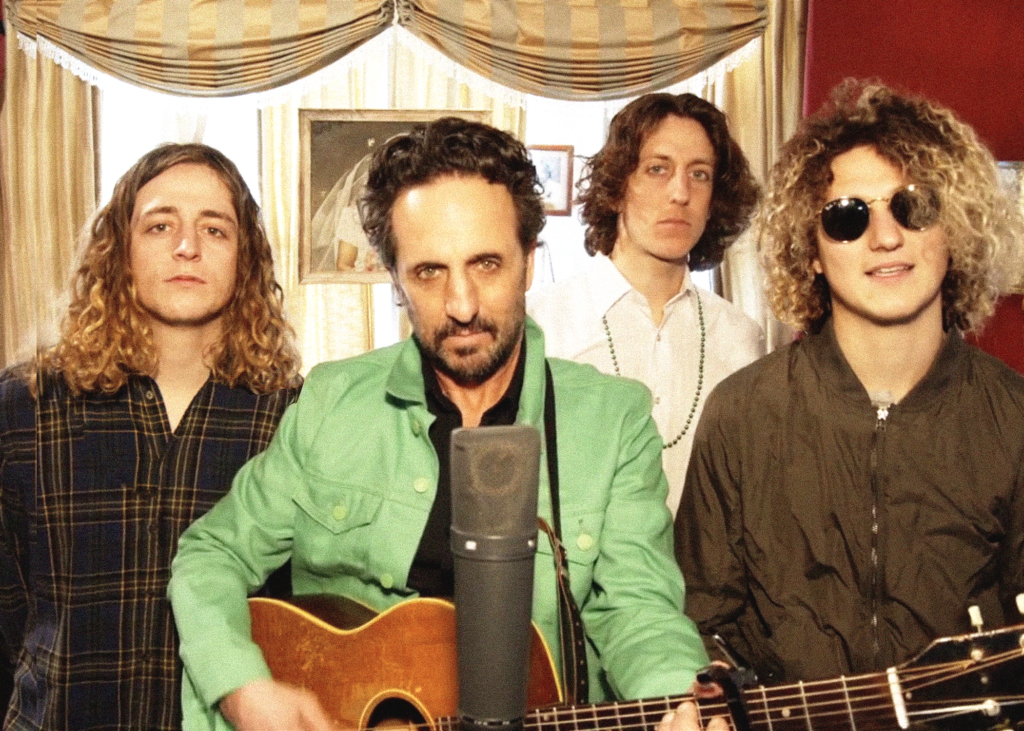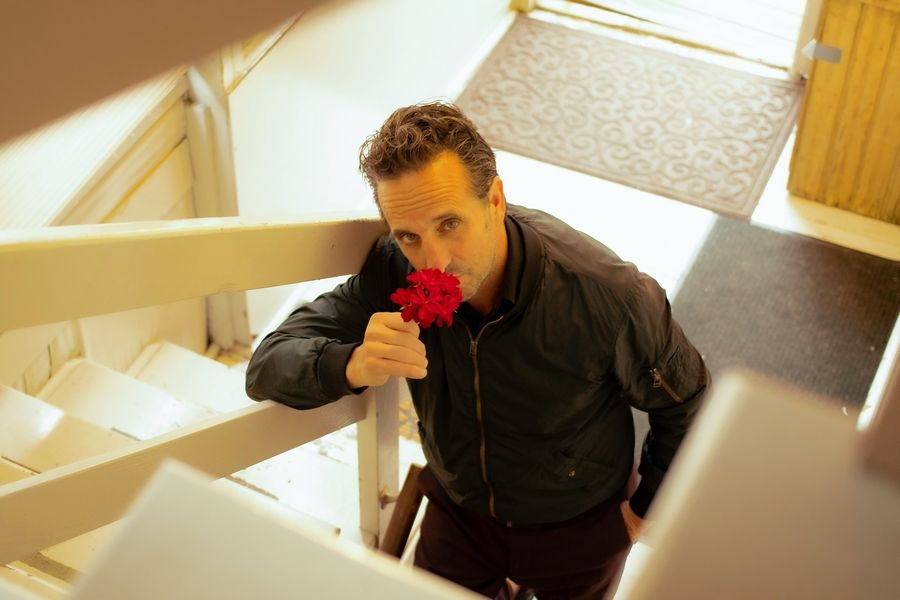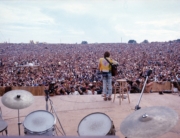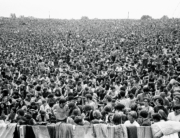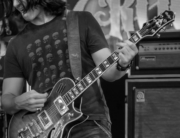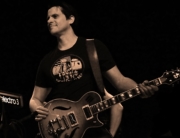Chicago-Bred Songwriter Ike Reilly Tackles a Different Perspective to Move Because the Angels Beyond the Norm
By BELLA MARIE — DECEMBER 16, 2021
If there’s one thing we’ve learned about art, it’s that it has its own DNA forged from the experiences and feelings of those who create it. “In a way, I wish I could move beyond these things — but I can’t,” admits Chicago-based songwriter Ike Reilly. Reilly’s just-released eighth studio album, Because the Angels (Rock Ridge Music), is an album for listeners from all walks of life that moves beyond individual concerns to provide a more universal sense of relatability. Angels reminds us that, even after we’re long gone, our pasts and our heritage never truly leave us. As Reilly says, “I could die tomorrow. This might be the only thing anyone ever hears.”
As worthy of our listening time as it is, Because The Angels is more than its profound themes profess. The album is both a good time and a strong candidate for the very best thing to blast from your car speakers while you roll down the highway. Angels brings listeners back to the sound of true American rock with the hypnotic familiarity of “Little Messiahs,” the deceivingly bright headbanging of “Ashes to Ashes,” and the journey-denouement vibe permeating the rustic mellow canvas of “Racquel Blue.”
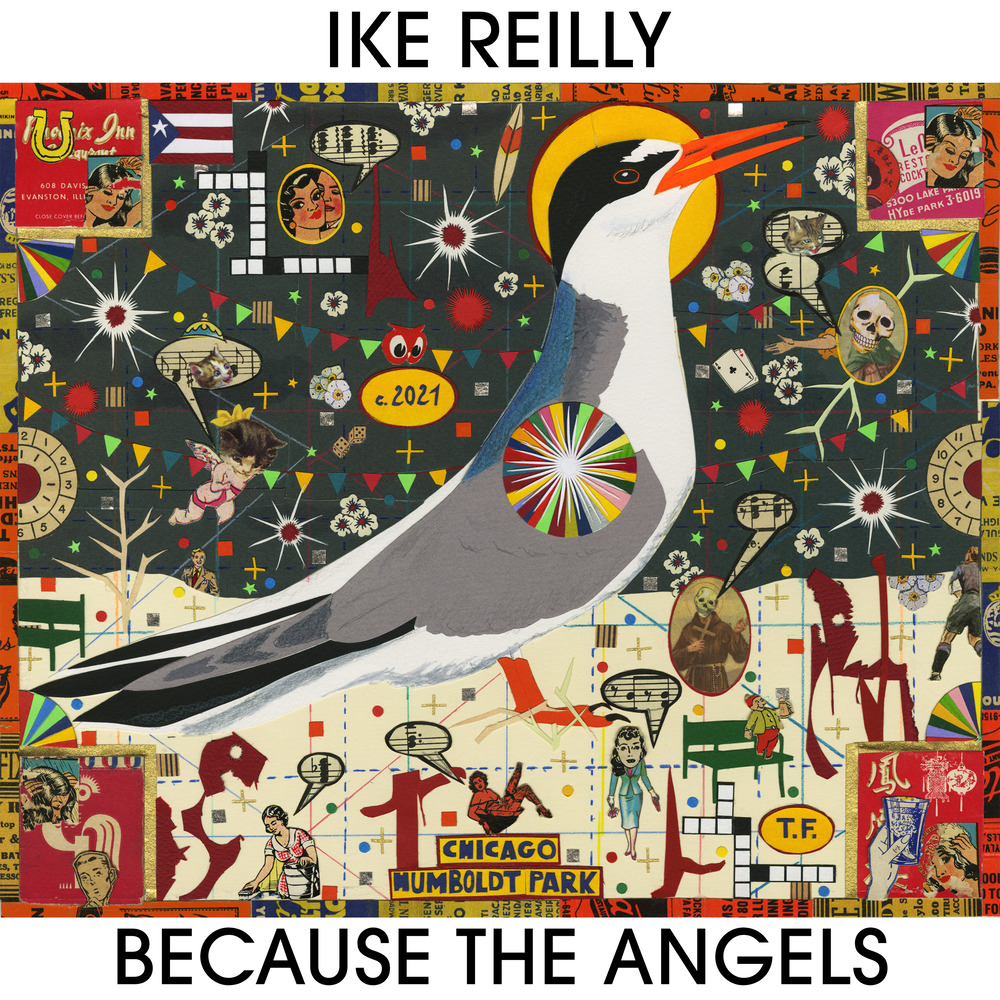
Not only that, Because the Angels also grabs us right from the get-go thanks to its thought-provoking title and stunning artwork, the latter courtesy of contemporary artist and fellow Chicagoan, Tony Fitzpatrick. “I sung him the chorus and he said, ‘Man, you’ve gotta name a record Because the Angels! And I’ve got just the artwork for you,’” Reilly clarifies before adding with a hearty chuckle, “When you can get artwork from Tony Fitzpatrick for some ‘hack’ rock and roll record, you take it!”
And take it he did. The album cover invokes imagery of, as Reilly puts it, “religious icons and antiquated Chicago icons” to delineate the kind of hypocrisy Because the Angels addresses. Fact is, the cover hints at the contents beneath the surface and how they trace back to the guitarist/vocalist’s roots while maintaining a consistency with the style of his music and overarching themes.
“Ashes to Ashes” (not Bowie-related!) is a song that ties directly into those themes. When asked what “Ashes” is really trying to say, Reilly admits to its deep-seated personal connection. “My life has been rooted in death and ritual, from my job at the cemetery to my studies,” he outlines, noting how the song ties into the album’s larger theme of death. “That song’s really about, ‘I don’t care how wealthy you are or how poor you are — there is no getting away from it. We will be in the earth. We will be dead.’ I don’t speak there to the afterlife or my thoughts on that; I just speak.”
When you get right down to it, Ike Reilly believes it’s ultimately about how we should all be bound together. “You know, these are the things we have in common and we all deny because of class and nationality and religion. We’re all humans,” he explains. “We should be bound by our birth and our death as human beings.” Reilly’s point here is truly universal. We all return to the dirt below us, no matter who we are or what we do. It’s quite the grand poetic statement for something played over a lively beat with a surf guitar, but that’s the genius of Reilly’s songwriting.
Because the Angels plays into the juxtaposition of morbid themes stacked up against deceivingly upbeat music. It works to evoke emotions specific to each song through its raw production choices and lyrical context. “Little Messiahs,” the album’s ostensible title track, is uniquely proficient in this variance of tone. Reilly states the song was originally just him and a guitar. In actuality, he was hesitant to record songs like “Messiahs,” “Laura,” and “The Failure of St. Michael” in what would be considered the “traditional way” because he didn’t want the album to fall into the Americana, dime-a-dozen rock band mold — he wanted to do something different. “I’m not saying we’re breaking new ground or anything, but we do try to challenge ourselves like having the intro of that song,” Reilly explains. (The challenge of the intro to “Messiahs” pays off by leaving its listeners surrounded by beautiful harmonies.)
Another strong feature of “Messiahs” is the spoken interlude. “It’s arpeggiated, and kind of in a different voice than the rest of the song. In that middle part, we wanted to take a sonic departure from the story,” details Reilly. “When I was mixing the song before I set it up, I had all this rant recorded. My microphone was on, and I was ranting and raving about some shit. It very well could have been the injustice I suffered at the supermarket.” Reilly then handed the track over to his producer Phil Karnats, who layered the rant for texture and made the words mostly unintelligible for added effect, leading the listener into a completely different ambient space than the rest of the song.
Reilly’s children were also involved in the production of the album. As a father, he made it a point not to pressure his kids into becoming musicians. That said, Shane, Kevin, and Mickey Reilly began working to create original music, all on their own. “Before I knew it, my oldest son Shane was writing all these songs — not in public, but he wasn’t afraid to do it,” Reilly says. Soon enough, they were on the road and performing with their father before the pandemic. “We just started jamming. I was mostly pleased with this [development],” Reilly marvels. “They were totally uninhibited, and they found music to be cathartic. It was just like playing a videogame for some kids.”
Furthermore, Reilly wanted to teach his kids to “have an open mind for any kind of person, any kind of music,” and to be confident in themselves as well. Indeed, Reilly has strived to do his best to instill these values in his children for a very long time. “Not everybody in small towns has a small-town mentality, but it exists,” he declares. “It definitely does.”
The longtime resident of Libertyville, Illinois gladly shares the story of Tom Morello — best known for being a passionate activist as well as the innovative guitarist for Rage Against the Machine — who also happens to be another native of Reilly’s hometown. “Tom’s first gig of his life was my wife’s eighth-grade graduation party,” he confirms. “When they were both in eighth grade together, his mother was my teacher. He was the first African-American person ever to live in our town, and she taught African studies at Libertyville High School.” Adds Reilly, “She wasn’t the only person who enlightened me. Music also enlightened me — The Clash, Bob Dylan. Three-chord blues music.”
In effect, music is what gave Reilly the bigger worldview that makes his creative palette possible, and he wants his music to do for others what records did for him. His wish is simple: “If my album could reach anybody, I don’t care whether it pushes them one way or another — but if it takes them out of their own day-to-day existence about where they live and how they view things, that’d be cool.”
One particular Angels song that does just that is “The Failure of St. Michael,” which is among the album’s most thematically intriguing songs. “I was actually in this church sleeping in Mexico. It was in San Miguel,” Reilly recalls. He soon discovered the art pieces in rural Mexican churches have a morbid edge that spoke to him. For example, Reilly found seeing the imagery of Jesus in caskets to be quite fascinating: “As I slept in this chapel for days on end on the floor, I started to think about St. Michael — and, of course, he’s the archangel who’s supposed to have a sword to protect us from Satan.”
The primary allusion of “The Failure of St. Michael,” according to Reilly, “is representative of what happens when faith fails people, and how that affects them.” The songwriter had this conflict in mind when he developed the characters for the story — two barflies held together by a secret: both of them were wronged by someone. “It could be a lot of different things, but it’s about the failure of St. Michael to really protect innocent people,” he confirms. That failure is what has suchan impact on these two characters: “Now they’re leaning on booze and drugs. That’s an oversimplification, but that’s why I chose St. Michael.”
Like a lot of Because the Angels, “The Failure of St. Michael” is an extension of Reilly’s personal relationship with religion over the years, and how it’s influenced him. “I don’t really believe in any of this stuff anymore, but it permeated so much of me being raised Catholic,” he confesses. “I personally believe these things really separate us more than bring us together. I’m steeped in all this knowledge, so it works its way into my songs.”
Whenever Reilly writes in a more freestyle verse, sometimes things like the story of Lazarus will make an appearance, even if he wants to move past some of that imagery. He continues, “I don’t really believe saints exist, so I don’t really believe saints can protect us — but other people do, and when faith lets people down, those are the kind of things I’m interested in.” Reilly’s music often calls out the hypocrisy of these systems of faith through the stories of those that believe them, and the references associated with them.
One of the primary appeals of Reilly’s broad catalog of songs is his storytelling acumen, which striking newer pieces like the crucial Because the Angels track “Laura” make even more evident. When it comes to his goals for any given song, Reilly professes, “in order to communicate and have it mean anything. I think it’s important to really be telling a story.” In Reilly’s eyes, this doesn’t have to mean a song has a linear narrative with a clear Point A to Point B. “Whatever this story is, if it’s esoteric, you just have to take something that connects your heart, your head, and your performance.”
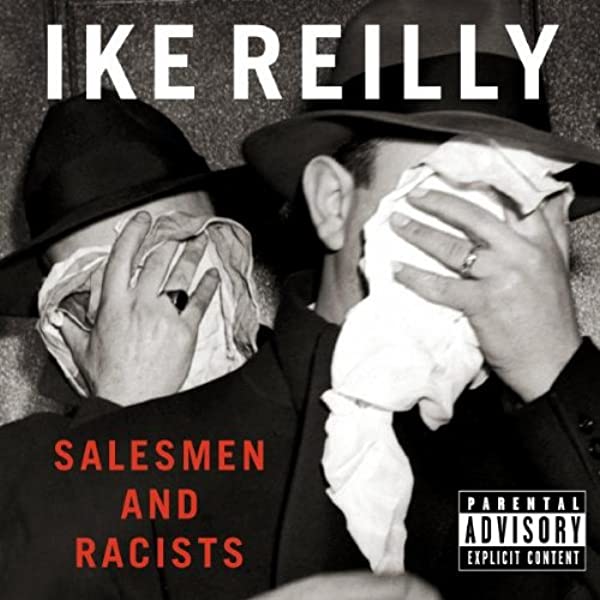
This creative evolution is one of the many ways Reilly has grown since his debut album, July 2001’s Salesmen and Racists. Despite being close to 40 years old at the time of its release, Reilly says he was still “immature,” adding that he was working outside of music and, well, drinking frequently. “I captured all that [on Salesmen], and then it kind of validated I wasn’t totally a hack,” he reflects. “I think by sheer attrition and work ethic, I can say things I want to say now, without sounding heavy-handed. I don’t know if this is going to translate into any kind of commercial success, but my goal is to continually be unique and authentic. If I hear something in my stuff that sounds disingenuous or hokey, you’ll never hear it.”
And that is just one of the many angles that make Because the Angels truly special. All throughout this singular album, Ike Reilly moves beyond himself and his life to deliver a lyrically and musically exceptional piece of work worthy of being a presence in the lives of each and every listener it touches.
Bella Marie is a young journalist and orchestral musician with a passion for all things media. This is the first article of many with her byline that will appear here on The SoundBard.
